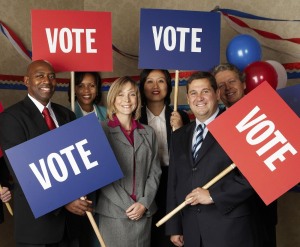 Do you know where your candidates for the upcoming General Election stand on hot button issues like unemployment, property taxes, education, eminent domain, and the state’s energy needs? As part of an effort to encourage informed participation, the League of Women Voters of New Jersey has published the responses of the candidates running for New Jersey Senate and Assembly to 10 hard hitting questions about these issues in its 2011 Voters Guide. This guide is available on the League’s website, www.lwvnj.org.
Do you know where your candidates for the upcoming General Election stand on hot button issues like unemployment, property taxes, education, eminent domain, and the state’s energy needs? As part of an effort to encourage informed participation, the League of Women Voters of New Jersey has published the responses of the candidates running for New Jersey Senate and Assembly to 10 hard hitting questions about these issues in its 2011 Voters Guide. This guide is available on the League’s website, www.lwvnj.org.
The questions reflect what matters most to New Jersey’s voters. Listed by district, the online 2011 Voters Guide provides an easy way of accessing the candidates’ responses. There is a link to help voters find their district, which may have changed as a result of the 2010 census and redistricting.
There is also an analysis of the statewide public question that will appear on the November 8th ballot. The League’s analysis of the ballot question includes the question and interpretive statement that will be found on the ballot, as well as a background of the question and reasons for voting yes and reasons for voting no. The statewide public question asks if voters will allow the Legislature, when permitted by federal law, to legalize the placing of bets on certain sports events at casinos, racetracks, and former racetrack sites.
 The 2011 Voters Guide, the ballot question analysis, redistricting information, and a wealth of additional voter service information can be found at www.lwvnj.org. In addition, the League of Women Voters of New Jersey also offers a toll-free hotline, 1-800-792-VOTE (8683) for members of the public to call in with their voting questions. That hotline is staffed during business hours and will also be available on Election Day while the polls are open (6 am – 8 pm) for voters in need of assistance.
The 2011 Voters Guide, the ballot question analysis, redistricting information, and a wealth of additional voter service information can be found at www.lwvnj.org. In addition, the League of Women Voters of New Jersey also offers a toll-free hotline, 1-800-792-VOTE (8683) for members of the public to call in with their voting questions. That hotline is staffed during business hours and will also be available on Election Day while the polls are open (6 am – 8 pm) for voters in need of assistance.
